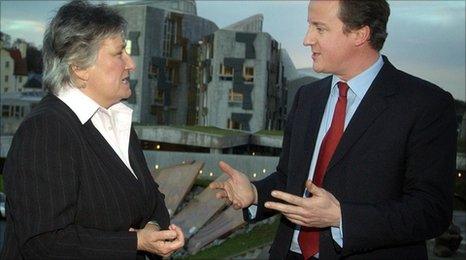Scottish Conservatives on election 'red alert'
- Published

Annabel Goldie will argue that the Tories have the economic answers needed
On the afternoon of Thursday 10 March, something interesting happened in the main chamber of the Scottish Parliament.
During a debate on new powers for Holyrood, a backbench Tory MSP called Margaret Mitchell rose to her feet and broke ranks with her party.
Ms Mitchell, an arch-unionist, urged parliament to support a referendum before new financial powers, such as those proposed under the current Scotland Bill (supported by her party), be devolved.
She argued that constitutional change was not high up constituents' priority lists, especially those struggling to pay the bills or find work, and said MSPs were "guilty of talking largely to themselves or academics".
Now, not a large number of people in the world-at-large took huge notice of these comments, and Ms Mitchell, having campaigned against devolution, did ultimately chose to take the MSP salary after standing for election.
But this event did throw into public focus the split in the Scottish Conservatives between those who support devolution and the furthering of it, and those who are against.
Big challenge
Scottish devolution led to something of a revival in the fortunes of the party, seen for years north of the border as a "toxic brand".
But the last UK election saw a sharp reality check for the Tories - returned as the largest party, but with just one MP in Scotland.
In the coming Scottish election, the Tories have a big challenge ahead.
For a start, there will be a tough fight for votes between the two biggest parties, the SNP and Labour, while both will seek to portray the Conservatives as a party of swingeing spending cuts.
So the strategy for the Scottish Tories isn't really all that different from the Lib Dems.
Recently, deputy prime minister Nick Clegg told Scottish activists that, when knocking on doors, they should tell voters all about Lib Dem policies which have now become reality.
The Scottish Conservatives will go into the election saying it's thanks to them that the SNP minority government has implemented Tory policies, such as boosting police officer numbers, bringing in rates relief for struggling small businesses and acting as the driving force behind a new drug strategy.
At the same time the party will say - "yes we know the spending cuts are tough", but will strongly argue that reducing the deficit is vital to economic recovery to re-build the country's future.
And while the Margaret Mitchell incident wasn't exactly headline news, the recent review of the party by Tory peer Lord Sanderson said the Scottish Conservatives needed a serious overhaul, under a style of governance which would require leader Annabel Goldie to re-apply for her job after the election.
And while the Scottish Conservatives are about to fight their first Holyrood election campaign with one of their own as UK prime minister - could that be more of a hindrance than a help?
Miss Goldie has now put her party on "red alert" for the election - again positioning her party as being pivotal to delivering more Tory policies in the event of an SNP or Labour minority government
It's a realistic strategy the party hopes will pay off at the polls - it may be a while yet before the party could claim victory in a Scottish election.